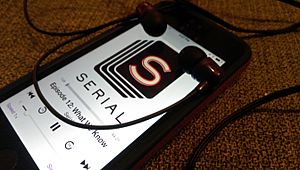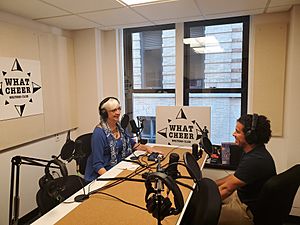Podcast facts for kids

A podcast is a program made available in digital format for download over the Internet. For example, an episodic series of digital audio files that a user can download to a personal device to listen to at a time of their choosing. Podcasts are primarily an audio medium, with some programs offering a supplemental video component. Streaming applications and podcasting services provide a convenient and integrated way to manage a personal consumption queue across many podcast sources and playback devices. There are also podcast search engines, which help users find and share podcast episodes.
A podcast series usually features one or more recurring hosts engaged in a discussion about a particular topic or current event. Discussion and content within a podcast can range from carefully scripted to completely improvised. Podcasts combine elaborate and artistic sound production with thematic concerns ranging from scientific research to slice-of-life journalism. Many podcast series provide an associated website with links and show notes, guest biographies, transcripts, additional resources, commentary, and occasionally a community forum dedicated to discussing the show's content.
The cost to the consumer is low, with many podcasts free to download. Some podcasts are underwritten by corporations or sponsored, with the inclusion of commercial advertisements. In other cases, a podcast could be a business venture supported by some combination of a paid subscription model, advertising or product delivered after sale. Because podcast content is often free, podcasting is often classified as a disruptive medium, adverse to the maintenance of traditional revenue models.
Podcasting is the preparation and distribution of audio files using RSS feeds to the devices of subscribed users. A podcaster normally buys this service from a podcast hosting company like SoundCloud or Libsyn. Hosting companies then distribute these audio files to streaming services, such as Apple and Spotify, which users can listen to on their smartphones or digital music and multimedia players, like an iPhone.
As of December 2022[update], there are at least 2,999,008 podcasts and 152,596,784 episodes.
Contents
Etymology
"Podcast" is a portmanteau of "iPod" and "broadcast". The earliest use of "podcasting" was traced to The Guardian columnist and BBC journalist Ben Hammersley, who coined it in early February 2004 while writing an article for The Guardian newspaper. The term was first used in the audioblogging community in September 2004, when Danny Gregoire introduced it in a message to the iPodder-dev mailing list, from where it was adopted by podcaster Adam Curry. Despite the etymology, the content can be accessed using any computer or similar device that can play media files. The term "podcast" predates Apple's addition of podcasting features to the iPod and the iTunes software. Some sources have suggested the backronym "portable on demand" or "play on demand" for POD to avoid the loose reference to the iPod. This usage has been criticized as a retcon by tech blogger John Gruber.
Production and listening
A podcast generator maintains a central list of the files on a server as a web feed that one can access through the Internet. The listener or viewer uses special client application software on a computer or media player, known as a podcast client, which accesses this web feed, checks it for updates, and downloads any new files in the series. This process can be automated to download new files automatically, so it may seem to listeners as though podcasters broadcast or "push" new episodes to them. Podcast files can be stored locally on the user's device, or streamed directly. There are several different mobile applications that allow people to follow and listen to podcasts. Many of these applications allow users to download podcasts or stream them on demand. Most podcast players or applications allow listeners to skip around the podcast and to control the playback speed.
Podcasting has been considered a converged medium (a medium that brings together audio, the web and portable media players), as well as a disruptive technology that has caused some individuals in radio broadcasting to reconsider established practices and preconceptions about audiences, consumption, production and distribution.
Podcasts can be produced at little to no cost and are usually disseminated free-of-charge, which sets this medium apart from the traditional 20th-century model of "gate-kept" media and their production tools. Podcasters can, however, still monetize their podcasts by allowing companies to purchase ad time. They can also garner support from listeners through crowdfunding websites like Patreon, which provide special extras and content to listeners for a fee.
Types of podcasts
Podcasts vary in style, format, and topical content. Podcasts are partially patterned on previous media genres but depart from them systematically in certain computationally observable stylistic respects. The conventions and constraints which govern that variation are emerging and vary over time and markets; podcast listeners have various preferences of styles but conventions to address them and communicate about them are still unformed. Some current examples of types of podcasts are given below. This list is likely to change as new types of content, new technology to consume podcasts, and new use cases emerge.
Enhanced podcasts
An enhanced podcast, also known as a slidecast, is a type of podcast that combines audio with a slide show presentation. It is similar to a video podcast in that it combines dynamically generated imagery with audio synchronization, but it is different in that it uses presentation software to create the imagery and the sequence of display separately from the time of the original audio podcast recording. The Free Dictionary, YourDictionary, and PC Magazine define an enhanced podcast as "an electronic slide show delivered as a podcast". Enhanced podcasts are podcasts that incorporate graphics and chapters. iTunes developed an enhanced podcast feature called "Audio Hyperlinking" that they patented in 2012. Enhanced podcasts can be used by businesses or in education. Enhanced podcasts can be created using QuickTime AAC or Windows Media files. Enhanced podcasts were first used in 2006.
Fiction podcast
A fiction podcast (also referred to as a "scripted podcast" or "audio drama") is similar to a radio drama, but in podcast form. They deliver a fictional story, usually told over multiple episodes and seasons, using multiple voice actors, dialogue, sound effects, and music to enrich the story. Fiction podcasts have attracted a number of well-known actors as voice talents, including Demi Moore and Matthew McConaughey as well as from content producers like Netflix, Spotify, Marvel, and DC Comics. While science fiction and horror are quite popular, fiction podcasts cover a full range of literary genres from romance, comedy, and drama to fantasy, sci-fi, and detective fiction. Examples of fiction podcasts include The Bright Sessions, The Magnus Archives, Homecoming, Wooden Overcoats , We're Alive and Wolverine: The Long Night.
Podcast novels
A podcast novel (also known as a "serialized audiobook" or "podcast audiobook") is a literary form that combines the concepts of a podcast and an audiobook. Like a traditional novel, a podcast novel is a work of literary fiction; however, it is recorded into episodes that are delivered online over a period of time. The episodes may be delivered automatically via RSS or through a website, blog, or other syndication method. Episodes can be released on a regular schedule, e.g., once a week, or irregularly as each episode is completed. In the same manner as audiobooks, some podcast novels are elaborately narrated with sound effects and separate voice actors for each character, similar to a radio play or scripted podcast, but many have a single narrator and few or no sound effects.
Some podcast novelists give away a free podcast version of their book as a form of promotion. On occasion such novelists have secured publishing contracts to have their novels printed. Podcast novelists have commented that podcasting their novels lets them build audiences even if they cannot get a publisher to buy their books. These audiences then make it easier to secure a printing deal with a publisher at a later date. These podcast novelists also claim the exposure that releasing a free podcast gains them makes up for the fact that they are giving away their work for free.
Video podcasts
A video podcast is a podcast that features supplemental video content. Web television series are often distributed as video podcasts. Dead End Days, a serialized dark comedy about zombies released from October 31, 2003, through 2004, is commonly believed to be the first video podcast.
Live podcasts
A number of podcasts are recorded either in total or for specific episodes in front of a live audience. Ticket sales allow the podcasters an additional way of monetizing. Some podcasts create specific live shows to tour which are not necessarily included on the podcast feed. Events including the London Podcast Festival, SF Sketchfest and others regularly give a platform for podcasters to perform live to audiences.
Technology
Software
Podcast episodes are widely stored and encoded in the mp3 digital audio format and then hosted on dedicated or shared webserver space. Syndication of podcasts' episodes across various websites and platforms is based on RSS feeds, an XML-formatted file citing information about the episode and the podcast itself.
Hardware
The most basic equipment for a podcast is a computer and a microphone. It is helpful to have a sound-proof room and headphones. The computer should have a recording or streaming application installed. Typical microphones for podcasting are connected using USB. If the podcast involves two or more people, each person requires a microphone, and a USB audio interface is needed to mix them together. If the podcast includes video (livestreaming), then a separate webcam might be needed, and additional lighting.
See also
See also
 In Spanish: Pódcast para niños
In Spanish: Pódcast para niños


